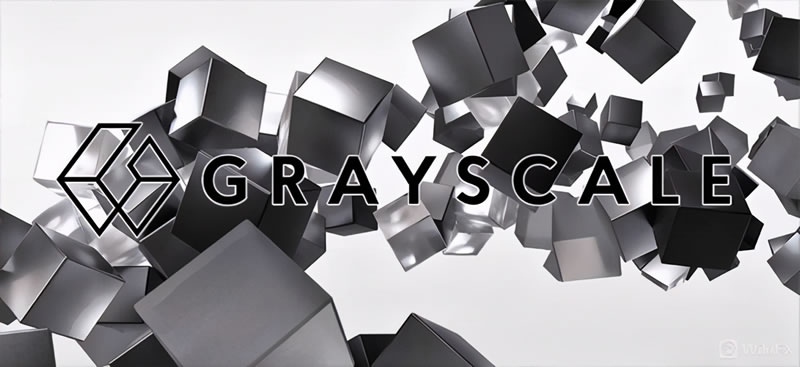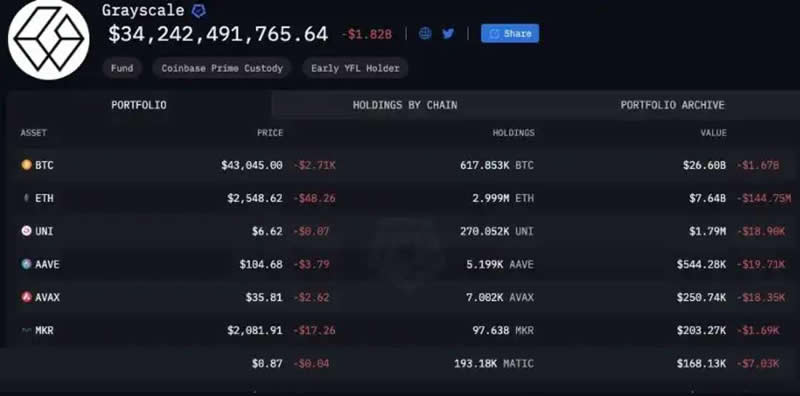 web3.0
web3.0
 Is it true that Grayscale Capital is selling Bitcoin? Is Grayscale Capital a capital fund?
Is it true that Grayscale Capital is selling Bitcoin? Is Grayscale Capital a capital fund?
Is it true that Grayscale Capital is selling Bitcoin? Is Grayscale Capital a capital fund?
php Editor Baicao Recently, rumors about Grayscale Capital selling Bitcoin have attracted market attention. Questions about whether Grayscale Capital is a capital market have also caused some discussion. Is it true that Grayscale Capital is selling Bitcoin? Is Grayscale Capital a capital market? This article will analyze and answer these questions to help readers better understand the current market situation.

Is it true that Grayscale Capital is selling Bitcoin?
It is true that Grayscale Capital is selling Bitcoin. Judging from the data on Arkham, the selling behavior has not occurred. As of January 15, judging from the marked Grayscale address, Grayscale’s holdings were approximately 617K Bitcoins, worth approximately US$26.6 billion, and outflows in recent days were approximately US$1.67 billion. In other words, Grayscale was not forced to sell most of its Bitcoins because customers continued to sell GBTC shares. The amount sold still only accounted for a small part.

#It is important to note that the absence of a sell-off currently does not mean that a sell-off will not occur in the future. If more people sell GBTC shares to buy other BTC shares in the future due to fee issues, and this selling behavior causes more people to choose to hold cash and wait and see after the price continues to fall, then the BTC price may continue to decline.
Everyone should understand an important fact. Selling Bitcoin is not the behavior of Grayscale as an institution. Grayscale's customers are those who want to redeem their investments, so Grayscale must abide by the sales contract. Grayscale is just an escrow company, and with the number of GBTC users locked up for years doubling, there will always be someone who needs funds. At the same time, Grayscale's management fees are also higher than other companies, which may cause some customers to be unwilling to host at Grayscale and choose to purchase from other companies to save costs.
Is Grayscale Capital a capital fund?
Grayscale Capital is not a fund disk. A fund disk is an illegal financial scam. It usually uses high returns as bait to encourage investors to invest funds, and then uses the funds of new investors to pay early investors to form a capital chain. This model is unsustainable and ultimately leads to losses for most participants.
Grayscale Capital was established in 2013 and is a legally registered and regulated company. The company is committed to providing transparent products and businesses, with its main product being digital asset trust funds. Investors can purchase these trusts to gain investment exposure to specific digital assets (such as Bitcoin, Ethereum, etc.) without directly holding these digital assets. Grayscale Capital’s trust funds provide investors with a convenient way to participate in the market for digital assets while reducing the risks associated with directly holding digital assets.
Grayscale Capital’s products are called Grayscale Trusts. These trust funds are based on specific digital assets and are managed by Grayscale Capital. Investors can purchase shares of these trust funds to indirectly own digital assets.
The above is the detailed content of Is it true that Grayscale Capital is selling Bitcoin? Is Grayscale Capital a capital fund?. For more information, please follow other related articles on the PHP Chinese website!

Hot AI Tools

Undresser.AI Undress
AI-powered app for creating realistic nude photos

AI Clothes Remover
Online AI tool for removing clothes from photos.

Undress AI Tool
Undress images for free

Clothoff.io
AI clothes remover

Video Face Swap
Swap faces in any video effortlessly with our completely free AI face swap tool!

Hot Article

Hot Tools

Notepad++7.3.1
Easy-to-use and free code editor

SublimeText3 Chinese version
Chinese version, very easy to use

Zend Studio 13.0.1
Powerful PHP integrated development environment

Dreamweaver CS6
Visual web development tools

SublimeText3 Mac version
God-level code editing software (SublimeText3)

Hot Topics
 Top 10 Digital Virtual Currency Apps Rankings: Top 10 Digital Currency Exchanges in Currency Circle Trading
Apr 22, 2025 pm 03:00 PM
Top 10 Digital Virtual Currency Apps Rankings: Top 10 Digital Currency Exchanges in Currency Circle Trading
Apr 22, 2025 pm 03:00 PM
The top ten digital virtual currency apps are: 1. OKX, 2. Binance, 3. gate.io, 4. Coinbase, 5. Kraken, 6. Huobi, 7. KuCoin, 8. Bitfinex, 9. Bitstamp, 10. Poloniex. These exchanges are selected based on factors such as transaction volume, user experience and security, and all provide a variety of digital currency trading services and an efficient trading experience.
 How to trade quantum chains
Apr 21, 2025 pm 11:42 PM
How to trade quantum chains
Apr 21, 2025 pm 11:42 PM
The quantum chain (Qtum) transaction process includes three stages: preliminary preparation, purchase and sale. 1. Preparation: Select a compliant exchange, register an account, perform identity verification, and set up a wallet. 2. Purchase quantum chains: recharge funds, find trading pairs, place orders (market orders or limit orders), and confirm transactions. 3. Sell quantum chains: Enter the trading page, select the trading pair and order type (market order or limit order), confirm the transaction and withdraw cash.
 What is a quantum chain? What are the quantum chain transactions?
Apr 21, 2025 pm 11:51 PM
What is a quantum chain? What are the quantum chain transactions?
Apr 21, 2025 pm 11:51 PM
Quantum Chain (Qtum) is an open source decentralized smart contract platform and value transmission protocol. 1. Technical features: BIP-compatible POS smart contract platform, combining the advantages of Bitcoin and Ethereum, introduces off-chain factors and enhances the flexibility of consensus mechanisms. 2. Design principle: realize on-chain and off-chain data interaction through main control contracts, be compatible with different blockchain technologies, flexible consensus mechanisms, and consider industry compliance. 3. Team and Development: An international team led by Shuai Chu, 80% of the quantum coins are used in the community, and 20% rewards the team and investors. Quantum chains are traded on Binance, Gate.io, OKX, Bithumb and Matcha exchanges.
 What are the digital currency trading apps suitable for beginners? Learn about the coin circle in one article
Apr 22, 2025 am 08:45 AM
What are the digital currency trading apps suitable for beginners? Learn about the coin circle in one article
Apr 22, 2025 am 08:45 AM
When choosing a digital currency trading platform suitable for beginners, you need to consider security, ease of use, educational resources and cost transparency: 1. Priority is given to platforms that provide cold storage, two-factor verification and asset insurance; 2. Apps with a simple interface and clear operation are more suitable for beginners; 3. The platform should provide learning tools such as tutorials and market analysis; 4. Pay attention to hidden costs such as transaction fees and cash withdrawal fees.
 Recommend several apps to buy mainstream coins in 2025 latest release
Apr 21, 2025 pm 11:54 PM
Recommend several apps to buy mainstream coins in 2025 latest release
Apr 21, 2025 pm 11:54 PM
APP software that can purchase mainstream coins includes: 1. Binance, the world's leading, large transaction volume and fast speed; 2. OKX, innovative products, low fees, high security; 3. Gate.io, a variety of assets and trading options, focusing on security; 4. Huobi (HTX), low fees, good user experience; 5. Coinbase, suitable for novices, high security; 6. Kraken, safe and compliant, providing a variety of services; 7. KuCoin, low fees, suitable for professional traders; 8. Gemini, emphasizes compliance, and provides custodial services; 9. Crypto.com, providing a variety of offers and services; 10. Bitstamp, an old exchange, strong liquidity,
 The latest updates to the oldest virtual currency rankings
Apr 22, 2025 am 07:18 AM
The latest updates to the oldest virtual currency rankings
Apr 22, 2025 am 07:18 AM
The ranking of virtual currencies’ “oldest” is as follows: 1. Bitcoin (BTC), issued on January 3, 2009, is the first decentralized digital currency. 2. Litecoin (LTC), released on October 7, 2011, is known as the "lightweight version of Bitcoin". 3. Ripple (XRP), issued in 2011, is designed for cross-border payments. 4. Dogecoin (DOGE), issued on December 6, 2013, is a "meme coin" based on the Litecoin code. 5. Ethereum (ETH), released on July 30, 2015, is the first platform to support smart contracts. 6. Tether (USDT), issued in 2014, is the first stablecoin to be anchored to the US dollar 1:1. 7. ADA,
 What does cross-chain transaction mean? What are the cross-chain transactions?
Apr 21, 2025 pm 11:39 PM
What does cross-chain transaction mean? What are the cross-chain transactions?
Apr 21, 2025 pm 11:39 PM
Exchanges that support cross-chain transactions: 1. Binance, 2. Uniswap, 3. SushiSwap, 4. Curve Finance, 5. Thorchain, 6. 1inch Exchange, 7. DLN Trade, these platforms support multi-chain asset transactions through various technologies.
 The top ten free platform recommendations for real-time data on currency circle markets are released
Apr 22, 2025 am 08:12 AM
The top ten free platform recommendations for real-time data on currency circle markets are released
Apr 22, 2025 am 08:12 AM
Cryptocurrency data platforms suitable for beginners include CoinMarketCap and non-small trumpet. 1. CoinMarketCap provides global real-time price, market value, and trading volume rankings for novice and basic analysis needs. 2. The non-small quotation provides a Chinese-friendly interface, suitable for Chinese users to quickly screen low-risk potential projects.




